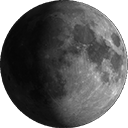By far, the best meteor shower of 2012 will be the Perseids meteor shower. What will make this particular shower stand out is the fact that there will be up to 60 meteors per hour on both August 12 and 13. After reaching this zenith, the shower begins to decline in number with the last Perseids meteor shower being witnessed on August 22. The sheer volume of meteors that will be seen is something spectacular to behold and promises not to disappoint. Continue reading
Current Moon Phase

Waxing Gibbous Moon The moon is currently in Virgo The moon is 11 days old
Distance: 63 earth radii
Ecliptic latitude: 2 degrees
Ecliptic longitude: 171 degrees-
